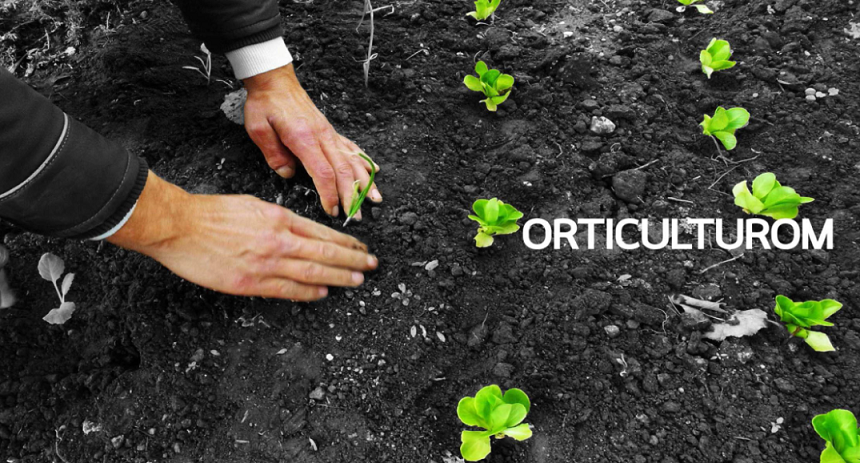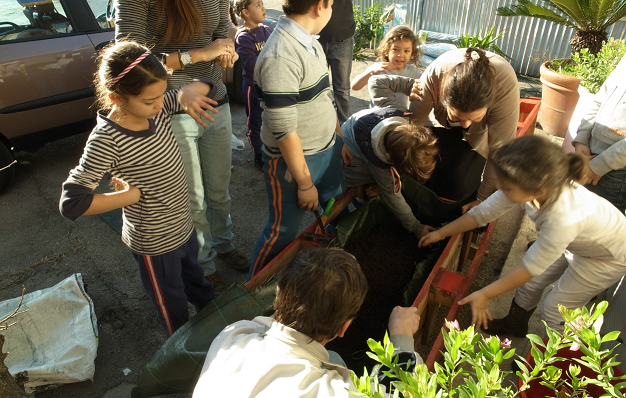This success story written by Luisa Cartesio, coordinator of the project "Orticulturom" within the association AltroPaesaggio, is part of the "Young women and Youth's Gender Perspectives in Agricultural Development" series that spotlight young professionals' experiences for women's empowerment in agricultural development. From research to private sector, mass media to civil society work, YPARD 2015 Gender series features, every month, young "gender champions" from different regions of the world. This series is part of YPARD work as special youth catalyst in the GAP : Gender in Agriculture Partnership.
The world and the agricultural landscape have always been part of my personal and professional growth. I lived as a child in a rural context characterized by family farmers involved in short supply chains’ projects in the region.
This success story written by Luisa Cartesio, coordinator of the project "Orticulturom" within the association AltroPaesaggio, is part of the "Young women and Youth's Gender Perspectives in Agricultural Development" series that spotlight young professionals' experiences for women's empowerment in agricultural development. From research to private sector, mass media to civil society work, YPARD 2015 Gender series features, every month, young "gender champions" from different regions of the world. This series is part of YPARD work as special youth catalyst in the GAP : Gender in Agriculture Partnership.
Why agriculture?
The world and the agricultural landscape have always been part of my personal and professional growth. I lived as a child in a rural context characterized by family farmers involved in short supply chains’ projects in the region.
At the age of 19, I decided to enrol in the faculty of Architecture in Naples with the aim of specializing and studying issues related to landscapes, in particular green and productive. In the last three years I dealt with agricultural issues in urban and suburban areas, as well as with food systems and their development in different contexts.
I am convinced that in any development strategy and management of a city both food industry and food resources should be added to the study of intra and extra-urban agricultural land. Having a concept is key and it should read as: “agriculture is an urban practice." One of my models is the project “Agropolis Munchen,” winner of the Open Scale 2009 and developed by a multidisciplinary team of architects, town planners and agronomists. This initiative calls for a strategy of food underground economy through a sustainable food chain.
Cultivating Urban Regeneration
My dream is to contribute to the realization of a "smart" city with "smart food policies.” This is why after getting information about different projects such as the one initiated by Live in Slums NGO, my intention was to do something in the city where I live: Naples. Around 80 years ago, this city like many others, had a booming building growth in a disorderly and widespread way, which greatly reduced its historic agricultural land.
In our modern 21st century city we find a high percentage of concrete infrastructure including buildings and roads where agricultural soil has significantly been reduced or is in a state of decay. In these areas unregulated settlements usually made of immigrant populations from war-torn or socioeconomically poor countries have arisen.
It was in one of these former agricultural areas filled with varying immigrant populations in Naples called “Scampia” where the idea of redeveloping natural and social context through the reintroduction of agriculture was born. I have named this action “Cultivating Urban Regeneration.”
Integrating the Roma-Italian communities through Urban Agriculture

In 2013, I together with the architect Liana de Miro, founded the association AltroPaesaggio. Its main goal is the redevelopment and urban regeneration through the 'activation of cultural and social processes.’ Ever since I have worked as a coordinator in the pilot project ”Orticulturom;” inside Scampia’s Gypsy settlement. The project received sponsorship from “MUSA” - the Agrarian Faculty of Naples - and the support of Dr Mauro Senatore and Valentina Ferreri to provide soil and plants' analysis.
This settlement is located in a former agricultural area that was abandoned due to its proximity to an industrial area. The population varies from Slavic to Macedonian, each divided into different ethnic communities with each community split into family units characterized by a traditional patriarchal system.
This community, like a slum-ghetto area, is socioeconomically poor with men unable to find regular jobs to support their families. Thus the first step of the project was to raise awareness within the community about the importance of a good nutrition. In this stage we observed that the main public attending our courses were women with an average age between 25 and 35 years.
As a result of this, “Orticulturom” became a project of Gypsy women. As a coordinator, the fact of being a woman has been an advantage for the approach and awareness about the different issues related to nutrition and the reintroduction of agriculture. In most cases Gypsy women fill the traditional domestic role as for example the preparation of food. I found that one of the principal problems in the community was a lack of nutritional education, characterized by a regular consumption of red meats, fats, and sugars.
Women would play an important role in educating the community in proper nutrition as well as in the following stages of the project. Thanks to the agricultural system introduced – which consisted of soilless cultivation crates through a simplified hydroponic system - women have managed to build manually containers filled with horticultural plants. Every girl now has become skilled manufacturer.
Thanks to their work, containers have become veritable raised vegetable gardens, enriched also by small-scale production of flowers under their own initiative and suggestion. Farming therefore has become not only a strictly productive question about food micro subsistence but also an aesthetic upgrade.
Ideas to carry "Orticulturom" project forward

The ultimate goal of the project is to create a micro-economy that goes beyond the Roma community and it’s expanded to the whole district by taking advantage of the existing networks - associations, schools, etc.-. For this, we need to ensure that the “orticulturom” project will be offered as a service and educational psychology and rehabilitation activities for that part of the female community, particularly those under house arrest.
We are planning to activate a small monthly incentive for the younger generations participating in the project through the creation of cooperatives. It would be great if we could little by little improve the quality control of products as well as keep increasing the collaboration with the University of Naples and Academia.
Integrating the Roma-Italian communities would be the final step of the process. By generating catering and food services within the district as well as school canteens we would be able to generate a little agro-economic network to improve social economic condition and connect the Italian and Gypsy cultures.
Watch "Orticulturom" project's video and don't hesitate to share with us your feedback on it!
Click here to read:
- Shaping my future in Gender, Agriculture and Global Development, by Moses Owiny, Project Officer with the Women of Uganda Network (WOUGNET);
- Empowering Women in Agriculture through Mentoring, by Michelle Jambui, Fulbright scholar graduate student;
- "While frustrating at times, challenges do make me far more passionate and determined", by Afrina Choudhury, Gender Specialist at the WorldFish;
- Agriculture has managed to change my career, by Wouedjie Alice-Norra, a lawyer who works at the Cameroon youth Initiative for Rural Development, CAMYIRD;
- A young spirit in search of change, by Anauim Valerín Pérez, a young journalist and environmental activist;
- Supporting Sinai Bedouin Women through Agriculture and Handicrafts, by Yasmeen Atta, founder of the Youth Sinai Foundation for Development and Human Rights and the Youth Sinai Development Company.
